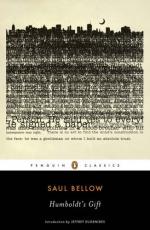|
This section contains 721 words (approx. 2 pages at 400 words per page) |

|
Humboldt's Gift Summary & Study Guide Description
Humboldt's Gift Summary & Study Guide includes comprehensive information and analysis to help you understand the book. This study guide contains the following sections:
This detailed literature summary also contains Literary Precedents and a Free Quiz on Humboldt's Gift by Saul Bellow.
Humboldt's Gift is a slice-of-life novel with undertones of dark comedy. From the perspective of Charlie Citrine, a poet and essayist of considerable success, it examines life in America from the 1930s through the mid-1970s. Much of the novel consists of Charlie's memories of his childhood in Chicago and his days in Greenwich Village with his mentor, Von Humboldt Fleischer, who has already descended into madness and death at the time of the telling. Charlie is driven throughout the novel by memories and recriminations of Humboldt. Saul Bellow is generally recognized as one of the great 20th Century American writers and won the Nobel Prize for literature for this work.
Humboldt's Gift begins with a brief review of Charlie's childhood in Chicago, when he first reads The Harlequin Ballads by New York poet Von Humboldt Fleischer. Charlie is so impressed by Humboldt's work that he borrows money from his teenage sweetheart and sets off to Greenwich Village to find and follow his new idol. Humboldt takes the young man under his wing, and they begin a life-long relationship that begins with the excitement of living as Marxists through the first years of the Cold War, decrying the establishment, cursing capitalism, drinking red wine and living the lives of poets and scholars.
Flashing back to the present - that is, Charlie's present in the mid-1970s - the now-middle-aged man awakens in his Chicago apartment to the worst day of his life. His ex-wife is suing him, and the IRS is after him. Also, he has been receiving threatening phone calls from a petty Chicago mobster named Rinaldo Cantabile. When he goes down to street level, he discovers that someone has destroyed his new Mercedes with baseball bats and hammers, and he knows precisely who it is - Rinaldo Cantabile. Rinaldo has been threatening Charlie because he stopped payment on a check written to the mobster to cover a poker debt. Charlie stopped payment when his friend George Swiebel informed him that Rinaldo and his cousin were cheating at the game George hosted. Charlie calls Rinaldo and agrees to settle up, but Rinaldo demands payment in a public forum to satisfy his pride. He takes Charlie through several comedic episodes at various Chicago landmarks, finally accepting payment on a girder of a skyscraper under construction on a windy Chicago night. Rinaldo now declares himself Charlie's friend and haunts him through the next approximately twelve weeks, even following him to Europe.
In the midst of mid-life crisis, Charlie is involved with Renata, a beautiful young woman with a voracious sexual appetite, deep knowledge of sensual delights, a love of expensive things and a longing to become Charlie's wife. Through flashbacks in Charlie's memory, the reader learns that Charlie was married to Denise and fathered two girl children with her. She has already taken much of the wealth he earned with a successful Broadway play that was turned into a movie, but she seems determined to take every thing he owns. After his marriage to Denise, Charlie falls in love with Demmie, who dies with her parents in a plane crash in a South American jungle.
Charlie is obsessed with the nature of death, fully believing that the spirit does not perish when one dies. Throughout Humboldt's Gift, Charlie spends many hours contemplating this and other metaphysical questions. By the conclusion of the novel, Charlie has developed the habit of talking with and reading to the dead. Bellow artfully and humorously weaves this particular anomaly of Charlie's into a well-textured tapestry of a neurotic man growing old in America.
Charlie is also dealing with the sexuality of an aging man, and the trauma and rite of passage associated with growing older. Being dumped in Madrid by his young lover devastates Charlie, but he emerges from the experience with a more mature, more settled attitude toward sexuality. Concurrent with these themes is the ever-present issue of struggle of artists to survive in a capitalist culture, which looks askance at serious writers and other artists as entertaining anomalies and cultural ornaments. While Charlie carries the main story line with his internal emotional and intellectual gymnastics, a host of secondary, minor and cameo characters add depth, breadth and countless witty insights into life in America, as defined in Chicago and New York.
Read more from the Study Guide
|
This section contains 721 words (approx. 2 pages at 400 words per page) |

|



